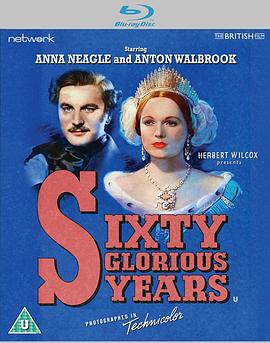简介
Sixty Glorious Years is an exercise in the creation of iconography, both for Victoria and its star, Anna Neagle (who subsequently became known as 'Regal Neagle'). Just as Elizabeth I commissioned artists to create flattering iconic images for public consumption, so this film performs a similar function, for Neagle is more beautiful than the real life Victoria. Controversial events (such as the 'Irish problem') are omitted and unpleasant aspects of Victoria's character (her petulance, arrogance, favouritism and 'right to privilege') are glossed over as endearing little 'whims'. Albert acts as a moderating influence when she goes too far. The film followed a year after the highly successful Victoria the Great (d. Herbert Wilcox, 1937). Again the screenplay is by Miles Malleson and Robert Vansittart, and many of the supporting cast (the cream of acting talent of period) repeat their roles, this time for the colour cameras. This was the first full length Technicolor film of cinematographer Freddie Young, who captures the spectacle of royal weddings, grand balls and opulent interiors, with scenes actually filmed at royal palaces. Vivid battle scenes, set in Alexander Korda's empire territory (Sevastopol and the Sudan), rival those in The Four Feathers (d. Zoltan Korda 1939). The title music sets the tone a regal choir sings over a shot of the crown. Elgar's 1901 'Pomp and Circumstance' march is heard during the diamond jubilee celebrations and, as Victoria's coffin lies in state, the film concludes with Anthony Collins' stately music accompanied by the text of Rudyard Kipling's 'Lest we forget'. Combined with the emotional appeal of scenes of Victoria connecting with her 'ordinary folk', this is stirring stuff. The film connects with contemporary events of 1938. The release of two celebratory royal films was intended to boost public affection for the monarchy in the wake of Edward VIII's abdication. Anglo-German relations were another touchy subject. With another war on the horizon, influential voices wanted appeasement, and the film could be seen to fit that agenda. Victoria herself was of mainly German descent, nicknamed 'the grandmother of Europe', while Albert is a 'good German', charmingly played by Anton Walbrook as a cultured, decent man. Sixty Glorious Years now seems unduly formal and reverential. Had movies existed during Victoria's reign (they only emerged at the end) this might have been the kind of film produced. Unlike Mrs Brown (d. John Madden, 1997), it is all so very 'Victorian'. Roger Philip Mellor
猜你喜欢
-
HD中字
再见溪谷
主演:真木阳子,大西信满,铃木杏,大森南朋,井浦新,新井浩文,鹤田真由,木下邦家,三浦真己,薬袋いづみ,池内万作,木野花 -
HD中字
再见,妈妈
主演:岭清,武田家辉,红桃,阮清秀,阮黄娇贞,红映,苏邓氏善,Thi,Kieu,Trinh,Nguyen,Linh,Ha,Thanh,Tu,Nguyen,黎公煌,有义,Thanh,Ha,Mai,阮黄蝶 -
HD中字
再见了德彪西:钢琴侦探岬洋介
主演:东出昌大,黑岛结菜,武田真治,正名仆蔵,上白石萌歌,岛田久作,金田明夫,半海一晃,宍户美和公,青木珠菜,富山绘里子,小川涼,木之实奈奈,菊池桃子,木村绿子,北大路欣也 -
HD中字
再见 南屏晚钟
主演:南吉,娜仁花,吴任远,托马斯·菲凯,张馨月,姜冰,康轩,明星,李福竹,王溪鹭,黎俊言,陈振远,孙佳,方馨蒂莲,崔楠,姚金飞,赵中娟,林子涵 -
HD中字
再见少女时代
主演:李苗英,孔奇力,蒿怡帆 -
HD中字
再见东京
主演:Christoph,Hagen,Dittmann,Heio,von,Stetten,Gerd,Lohmeyer,米夏埃尔·哈贝克,Doreén,Dietel,Miki,Murai -
HD中字
再见十八班
主演:柯焱曦,熊婧文,秦海 -
HD中字
再爱24小时
主演:赖帅明,文祥,马莹莹 -
HD中字
再见再见
主演:汤厉昊,尹维周,崔琼尹 -
HD中字
再见列宁
主演:丹尼尔·布鲁赫,卡特琳·萨斯,丘尔潘·哈马托娃,弗洛里安·卢卡斯,亚历山大·拜尔 -
HD中字
再见国王
主演:尼克·诺特,奈杰尔·哈弗斯,弗兰克·麦克雷,Gerry,Lopez,马里林·托库达,Chang,Wing,Choy,阿基·阿莱格,马瑞斯·威尔斯,威廉·怀斯,韦恩·佩格拉姆,Richard,Morgan,Elan,Oberon,詹姆斯·福克斯,Michael,Nissman,约翰·贝内特·派瑞 -
HD
再见夏天
主演:郑帝元,金宝罗


